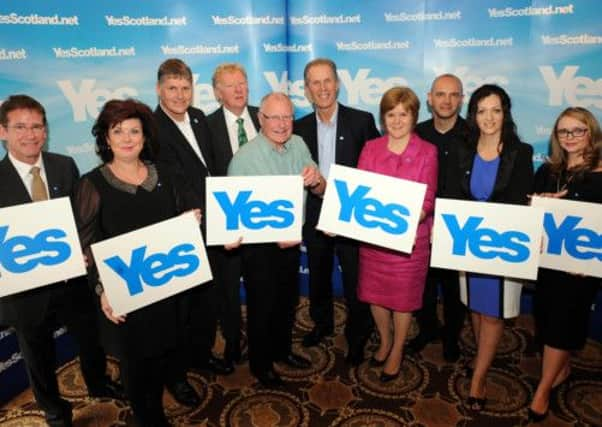Leaders: If SNP can show incomes will rise, so will Yes vote


The outcome, it suggests, critically hinges on a consideration that just will not go away: “The £500 Question”. It is not the desirability of political independence as such that may deliver the SNP victory next September, but whether Scots feel they will be better off as a result.
And this critically matters for the Yes campaign, for if it can convince voters that they would be better off, Alex Salmond would be swept to within a hair’s breadth of victory. According to the poll findings, 47 per cent of those canvassed say they will support independence next September if they can be assured it would make them £500 a year better off, transforming the Yes campaign’s current position.
Advertisement
Hide AdAdvertisement
Hide AdThe clear and unambiguous message is that if the Yes side is to have a good prospect of victory it will need to convince voters that it would result in a stronger economy, thereby leaving them better off.
Arguments that an independent Scotland would be a more equal country appear to cut little ice with voters. As Professor John Curtice bluntly puts it in our pages today: “People will have to be convinced there would be an extra £500 in their own pockets, not £500 in that of their less well-off neighbour.”
With almost a full year of campaigning still to go, this leaves the independence campaign with everything to go for. Its spirits currently may be tested by the persistent lead enjoyed by the Better Together campaign, but the SNP can fairly argue that its detailed white paper proposals for independence have yet to be unveiled. These are due to be disclosed shortly, most likely in November. And the Yes camp hopes that these should help supply more detailed information, address voter doubts and give fuller substance to the economic case for independence. At present many voters feel they just do not know enough at this stage to be confident of giving support to one side or another.
Meanwhile, the economic background to this battle is changing. There has been a series of indicators pointing to uplift and recovery. If this is sustained into the autumn of next year, it may weaken the “protest vote” element of SNP support, tempt voters to stay with the status quo – and raise the bar for that “£500 question”.
The immediate implication of these poll findings is that argument and debate over the SNP’s economic proposals will intensify in the coming weeks and months. That can only be a good thing. Two issues will come to the fore: the credibility of SNP proposals to introduce a significant reduction in the rate of Corporation Tax paid by business; and its commitment to a shared currency and pooling of monetary policy in a sterling zone.
If the debate on these fronts is not heated enough already, expect fireworks before long.
More female MSPs required
After the notoriety surrounding the conviction of Bill Walker for 23 domestic abuse offences, it is surely appropriate that the Dunfermline Labour Party has opted for a woman candidate, and one chosen from an all-woman final shortlist.
That immediately sets an example for the SNP to follow – the party which Walker originally stood for before forced to resign. He continued – to universal outrage – to remain in the Scottish Parliament as an independent even after his conviction. It is still a matter of astonishment that he was allowed to go forward at all as a candidate given the information that was readily accessible and indeed made available to the party.
Advertisement
Hide AdAdvertisement
Hide AdHowever, voters in Dunfermline will now wish a clean break from this disgraceful episode. The selected Labour candidate, Cara Hilton, should also benefit through her local connections and her record as a representative of the Dunfermline South ward on Fife Council.
But the by-election should be about more than a convulsive reaction to the Bill Walker scandal. There is a strong case for having more women in the Scottish Parliament whose female representation has slipped. It is testament enough to the contribution that women members have made that two of the main parties in the parliament are now led by women, while the SNP itself has a formidable Deputy First Minister in Nicola Sturgeon, whose contribution to government and politics is respected on all sides.
Scottish politics has undoubtedly gained from the presence of women at all levels of the parliament. The SNP might like to consider this when it comes to choose its candidate for Dunfermline.